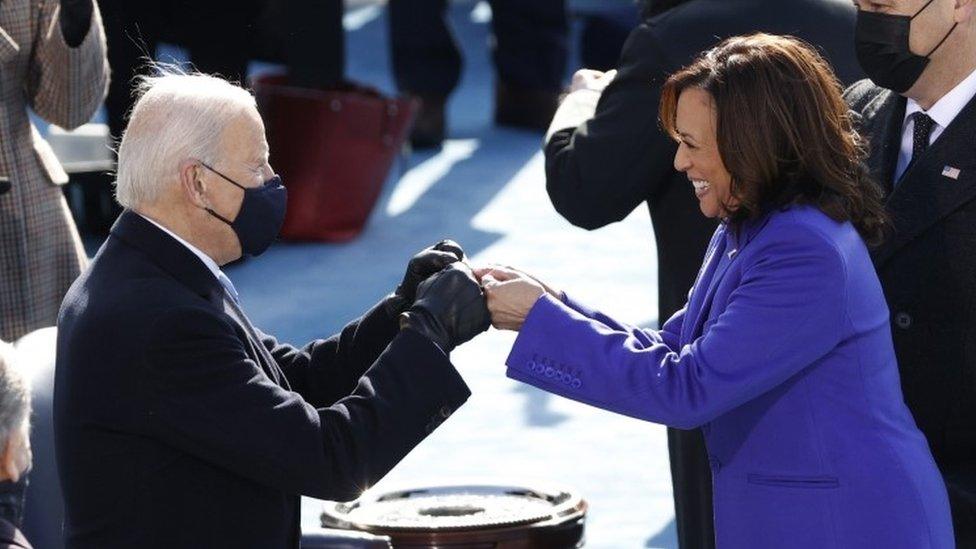Biden inauguration: Step forward after bumpy period - Boris Johnson
- Published
Johnson: "It's a big moment for us - we have things we want to do together."
The inauguration of President Joe Biden is a "step forward" for the United States, which has "been through a bumpy period", Boris Johnson has said.
Congratulating Mr Biden and Vice-President Kamala Harris, the UK PM said it was a "big moment" for the UK and the US and their "joint common agenda".
Mr Johnson said he looked forward to working with the US on tackling climate change and the coronavirus pandemic.
Making his inaugural address, Mr Biden said "democracy has prevailed".
He promised to be a president "for all Americans" and said his "whole soul is in putting America back together again".
Outgoing President Donald Trump, who has not formally conceded to Mr Biden, did not attend the ceremony.
President Biden began work straight away on reversing a number of his predecessor's policies, including rejoining the Paris climate change agreement - gaining the praise of Mr Johnson.
The PM tweeted it was "hugely positive news", adding: "I look forward to working with our US partners to do all we can to safeguard our planet."
Earlier this week the former head of the civil service Lord Sedwill suggested Mr Johnson would be glad Mr Trump had not been re-elected for a second term as US president.
Writing in the Daily Mail, Lord Sedwill said those who believed Boris Johnson would have preferred Mr Trump to win again were "mistaken".
The former cabinet secretary - who stepped down in September - said a second term for Mr Trump "would not have been to the benefit of British or European security, to transatlantic trade, let alone the environmental agenda to which the prime minister is so committed".
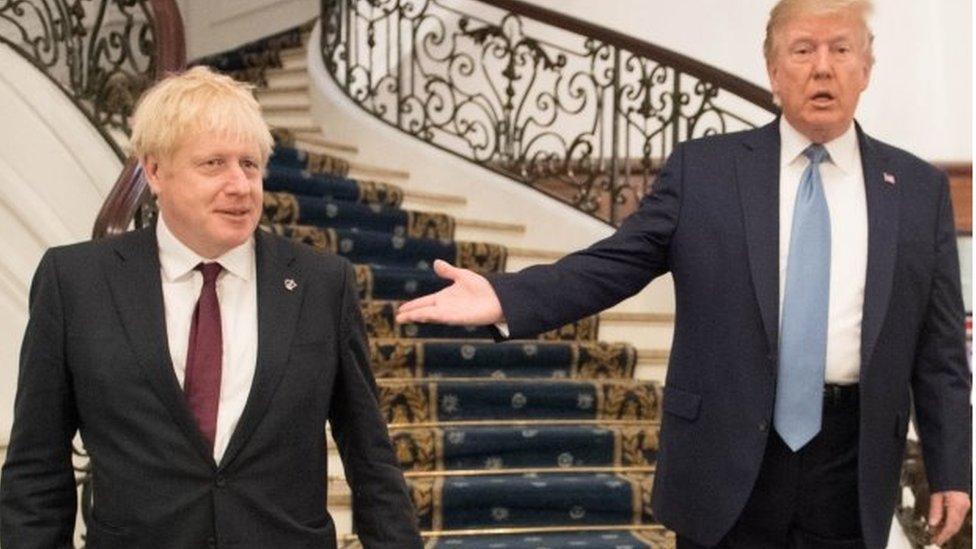
Boris Johnson with Donald Trump at the G7 summit in 2019
Mr Johnson's public stance toward the former president has varied over the years.
In 2015, when he was Mayor of London, Mr Johnson accused Mr Trump of "stupefying ignorance" over his comments about violence in the city.
But as foreign secretary, following Mr Trump's election as president, he said there was a "lot to be positive about", and in 2019, praised his "many good qualities".
For his part, Mr Trump has appeared largely supportive of Mr Johnson, backing his flagship Brexit policy and at one point saying of the British PM: "They call him Britain Trump."
And echoing his predecessor, in 2019 Mr Biden described the UK prime minister as a "physical and emotional clone" of Mr Trump.
After winning the presidential election Mr Biden phoned Mr Johnson ahead of other European leaders and expressed his desire to strengthen the historic "special relationship" between the two countries.
Speaking on Wednesday, Mr Johnson said it was the job of all UK prime ministers to have a "good, close working relationship" with US presidents but, right now, there were many things the two countries "wanted to do together".
"When you look at the issues which unite me and Joe Biden, the UK and the US right now, there is a fantastic joint common agenda," he said. "For us and America, it is a big moment."
He said he hoped the UK could help the US commit to a target of net zero carbon emissions by 2050 in the run up to the climate change conference COP 26, to be held in Glasgow this year.


UK prime ministers like to consider American presidents as their best diplomatic friend.
That relationship, particularly when it comes to security and defence, is unusually close.
When, as with Donald Trump, that friend has been unpredictable and unconventional, that has made for some very awkward political moments.
So for the government, this a really important and positive turning of the page.
The terribly over-used phrase the 'special relationship', which provokes neurotic behaviour on this side of the Atlantic, has meant the most when there has been a genuine personal chemistry between the two leaders - whether Thatcher and Reagan, or Bush and Blair.
There is nothing automatic about Mr Biden and Mr Johnson developing that kind of political friendship.
But in the words of one former senior minister, for the UK Biden means "we will lose exclusivity but gain predictability: easier to work with, less cringeworthy and more dependable, but we may not be the only girlfriend on speed dial".

Speaking to the Guardian,, external shadow foreign secretary Lisa Nandy described Mr Biden as "a woke guy".
Asked if he agreed, Mr Johnson said: "I can't comment on that. What I know is that he's a firm believer in the transatlantic alliance and that's a great thing."
He added that there was "nothing wrong with being woke - I put myself in the category of people who believe that it's important to stick up for your history, your traditions and your values, the things you believe in."
Opposition leader Sir Keir Starmer also sent his congratulations to the new president and vice-president.
"The US begins a new chapter in its history, one of hope, decency, compassion and strength," the Labour leader said, adding "together, our two nations can build a better, more optimistic future for our world."
And First Minister of Scotland Nicola Sturgeon tweeted: "Warm congratulations and best wishes to President Biden and Vice President Harris.
"Scotland and the USA share long-standing bonds of friendship and co-operation. We look forward to building on these in the years ahead."
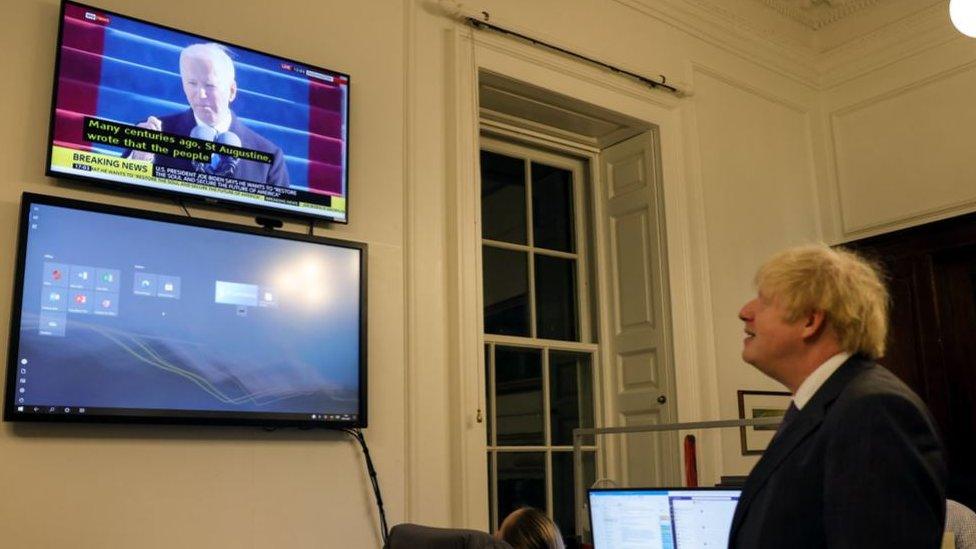
Mr Johnson watching the inauguration
Writing in the Daily Mail, former UK Prime Minister Theresa May said Mr Biden's election presented the UK with a "golden opportunity" for Western democracies to reverse the trend towards "absolutism" - and a "few strongmen facing off against each other" - in global affairs.
The Queen sent a private message to Mr Biden before his inauguration, Buckingham Palace has said.
Related topics
- Published20 January 2021
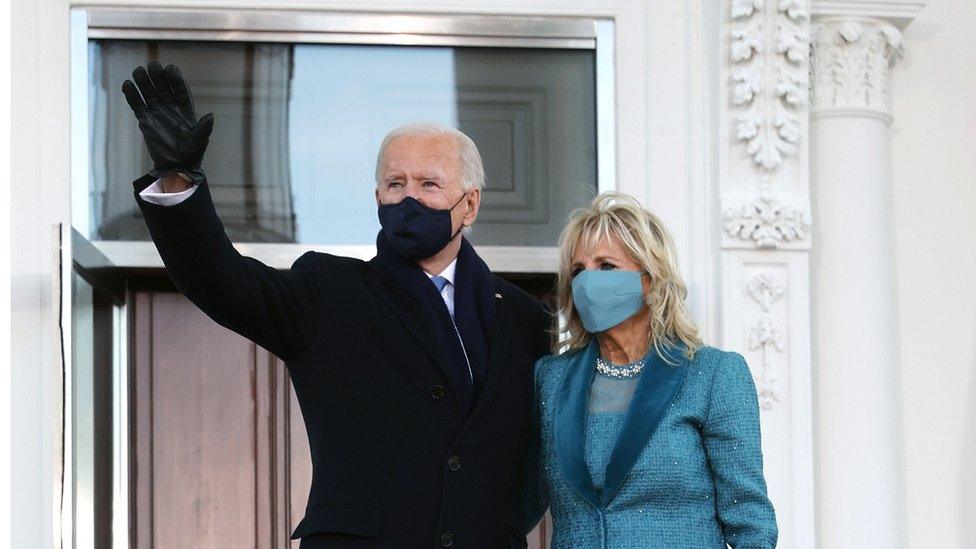
- Published9 November 2020
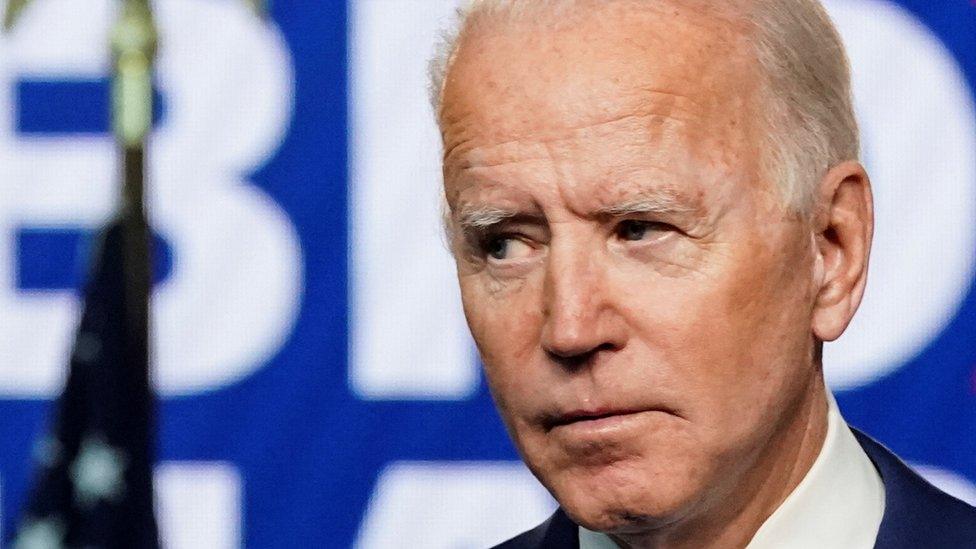
- Published21 January 2021
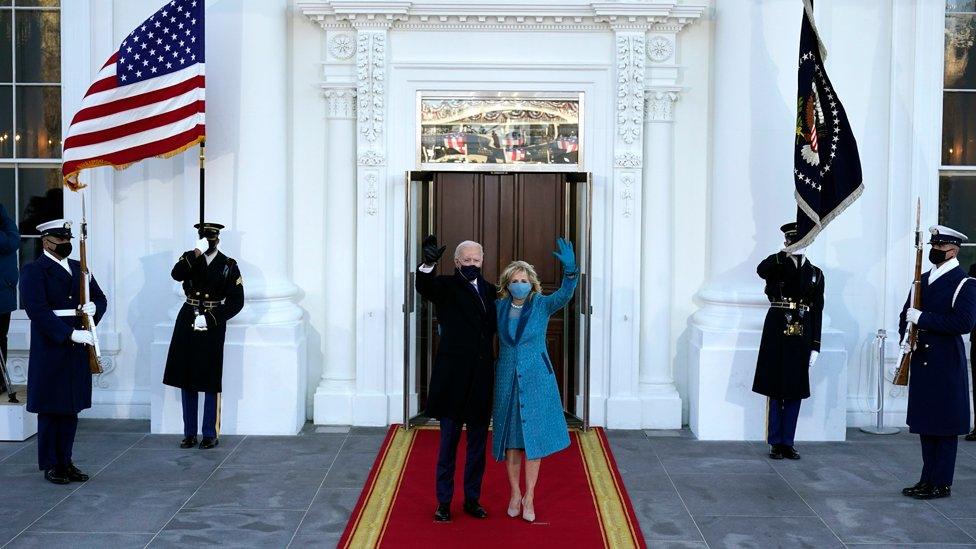
- Published20 January 2021
